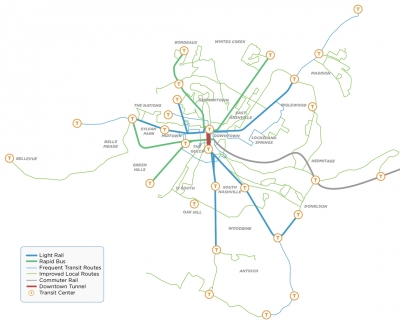SELC supports Nashville transit referendum
Nashville voters will soon have a say on an ambitious and forward-thinking public transit plan that could serve as the backbone of a truly regional transit network and transform transportation and land use in one of the country’s fastest-growing regions. A vote by the metropolitan city-county council last week gave the proposal the final approval needed to be placed on the May 1 ballot.
SELC attorney Anne Passino, a Nashville native, recently spoke before the council about the importance of putting this much-needed plan before voters.
Nashville needs smart transportation investments to improve the quality of life for everyone who lives and works here, especially as we continue to see rapid growth,” said Passino. She explained that SELC supports this transit proposal, because “it would provide alternatives to driving and to destructive road projects, expand access to transit, promote more walkable communities, and cut air pollution.” It also “creates a diverse transportation system that gives Nashvillians more transit choices, which will better connect us to each other without sacrificing our health, our communities, or our environment.
In Nashville, as is often the case, bad traffic and poor public health outcomes go hand-in-hand. A variety of reports consistently rank Nashville’s traffic as among the nation’s worst for its population. Nashville also has higher-than-average asthma rates and has had trouble meeting health standards for ozone pollution in the not-too-distant past. The combination makes air quality impacts from an almost exclusively car-based transportation system a growing public health problem in a region where it’s estimated that more than 100 people are moving each day. And the pattern across the U.S. shows that these impacts are not distributed equitably: communities of color and poor and working class communities suffer disproportionate impacts from transportation-related air pollution.
This map illustrates the network of public transit spread across the Nashville region envisioned in the Let’s Move Nashville plan.
Mapping It Out
Moreover, the transportation sector is the largest source of carbon pollution in Nashville, contributing more to climate change than even the energy sector. Coupled with sprawling growth patterns, left unchecked, the problem will only worsen.
To address the multiple – and growing – problems with the current transportation system, the $5.2 billion Let’s Move Nashville transit plan proposes a combination of approaches including more than 20 miles of light rail and better rapid bus service. Eventually, there would be four light rail corridors, serving about two dozen neighborhoods and extending in all directions from downtown—including a connection to Nashville International Airport. In the short term, more safe, frequent and reliable bus service will serve all corners of the community.
These transit system upgrades would be paid for by increases in the city sales tax, hotel-motel tax, rental car tax, and business and excise tax, a suite of measures that attempt to balance funding from residents with contributions from tourists and commuters from the surrounding region. Complementary efforts and legislation include proposals for lowering or eliminating transit fares for lower-income city residents and coupling the transit investments with investments in transit-oriented affordable housing.
Yonah Freemark, a traffic expert and founder of The Transport Politic blog, recently praised Nashville’s efforts. He wrote:
If the proposal is successfully implemented, it will make it possible to have a transit-oriented life in a city where living without a car is now virtually impossible. It will create the groundwork for an alternative mode of development than the parking-heavy construction that currently dominates.
The support of a coalition of more than 100 organizations, including SELC, shows the broad interests energized by this effort to build a better future for all of Nashville. Groups ranging from universities and major employers to conservation groups and community non-profits are all backing this plan and, on May 1, Nashville voters will decide the next chapter of their city’s future.
